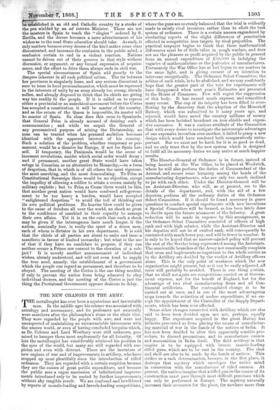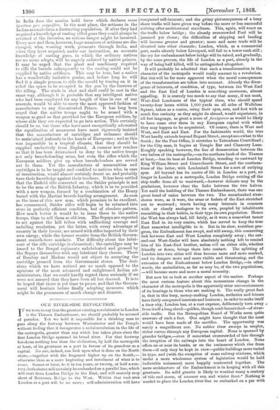THE NEW CHANGES IN THE ARMY.
THE metallurgist has ever been a mysterious and inscrutable man. In the middle ages his science was associated with astrology and necromancy, and its professors not unusually were searchers after the philosopher's stone or the elixir vita3. They were regarded by the people with awe, and were not unsuspected of maintaining an unwarrantable intercourse with the unseen world, or even of having concluded bargains which, as Dr. Colenso and Lord Westbury were still unknown, pro- mised to hamper them most unpleasantly for all futurity. Of late the metallurgist has considerably retrieved his position in the eyes of the world, but many are still regarded with sus- picion and even with distrust. These are the inventors of new engines of war and of improvements in artillery, who have cropped up most plentifully since the introduction of rifled ordnance. They are regarded with a certain suspicion because they are the causes of great public expenditure, and because the public sees a vague succession of infinitesimal improve- ments introduced only to be ousted by further improvements without ally tangible result. We are confused and bewildered by reports of muzzle-loading and breech-loading competitions,
where the guns are so evenly balanced that the trial is evidently made to satisfy rival inventors rather than to elicit the best system of ordnance. There is a certain nausea engendered by everlasting reports of the slight differences of penetration effected in competitive iron targets by rival projectiles. The practical taxpayer begins to think that these mathematical differences must be of little value in rough warfare, and does not see the pleasure or profit acquired by the public in general from an annual expenditure of £50,000 in indulging the vagaries of mathematicians or the jealousies of manufacturers. Fortunately the War Office has at last begun to see matters in the same light, and is giving earnest of an intention to intervene energetically. The Ordnance Select Committee, the arbiter of such trials, is to be abolished, and we may confidently hope that the greater part of the vote for experiments will have disappeared when next year's Estimates are presented to the House of Commons. Few will regret the suppression of this body. It has caused much expense, and committed many errors. The cup of its iniquity has been filled to over- flowing by the discovery that the adoption of the Moncrieff Battery, which was submitted to it many years ago, and rejected, would have saved the country millions of money which has been lavished broadcast on iron shields and expen- sive casemates. It was a curious attribute of the Committee that with every desire to investigate the microscopic advantages of one expensive invention over another, it failed to grasp a new design which would have rendered both comparatively unim- portant. But we must not be hard, for it is as good as dead, and we only trust that by the new system which is designed to fulfil all its necessary duties we may arrive at much happier results.
The Director-General of Ordnance is in future, instead of being located at the War Office, to be placed at Woolwich, where he will also perform the duties of Commandant of the Arsenal, and secure some harmony among the heads of the manufacturing departments, who are only too much inclined to jar with each other. Under the Director-General will be an Assistant-Director, who will, as at present, see to the details of the department, and, with the aid of a few deputies, perform all the ordinary duties of the Ordnance Select Committee. If it should be found necessary in grave questions to conduct special experiments with new inventions- a Special Committee will be formed, as has been lately done- to decide upon the future armament of the Infantry. A great reduction will be made in expense by this arrangement, as the Ordnance Select Committee consisted of officers of high rank and with high salaries, while the Assistant-Director and his deputies will not be of exalted rank, will consequently be contented with much lower pay, and will be fewer in number. It is only to be hoped that no narrow-in.inded policy will prevent the rest of the Service being represented among the Assistants. The unscientific branches of the Army not unnaturally complaii. that arms and implements as important to the whole service as to the Artillery are decided by the verdict of Artillery officers alone. This is the only point of weakness which the new organization might present, but as it can be easily adjusted, all error will probably be avoided. There is one thing certain, that we shall not again see competitions carried on at Govern- ment expense, not for the benefit of England, but for the advantage of two rival manufacturing firms and all Con-
tinental artillerists. The contemplated change is to be carried out at once, and is one of the most advantageous steps towards the reduction of useless expenditure, if we ex- cept the appointment of the Controller of the Supply Depart- ments, which has been ever effected.
Some other changes connected with Artillery which are also said to have been decided upon are not, perhaps, equally happy. The experience acquired in the great Mutiny has hitherto prevented us from placing the means of manufactur- ing mattlriel of war in the hands of the natives of India. It has now been decided to alter this apparently sensible pro- cedure, to discard precautions, and to manufacture cannon and ammunition in India itself. The field artillery in that empire is to be equipped with bronze muzzle-loading
rifled guns, which are to be cast in the country. The shot
and shell are also to be made by the hands of natives. This strikes us a rash determination, because, in the first place, it
destroys that mystery which envelopes the native mind
in connection with the manufacture of rifled cannon. At present, the natives imagine that a rifled gun in the course of its construction must pass through most difficult processes which can only be performed in Europe. The mystery naturally increases their reverence for the piece, for nowhere more than in India does the maxim hold force which declares omne ignotum pro magnifico. In the next place, the artizans in the Indian arsenals form a fluctuating population. If after they had acquired a knowledge of casting rifled guns they could always be retained at the factories, no scrims danger might be incurred. Every now and then, however, large numbers of artisans are dis- charged, who, wanting work, permeate through India, and when they have acquired, under our instruction, an accurate knowledge of casting guns, in which the ordinary natives are no mean adepts, will be eagerly enlisted by native princes. It may be urged that the plant and machinery required to rifle the barrels subsequently to the casting could not be supplied by native artificers. This may be true, but a native has a wonderfully imitative genius, and before long he will find it a simple process to rifle the mould by tracing on it in relief the space to be occupied in the gun by the furrows of the rifling. The studs in shot and shell could be cast in the same way, although it is probable that any intelligent native who had been employed for any length of time in one of our arsenals, would be able to carry the most approved fashion of manufacture to any discontented Prince. It has long been urged that the native troops ought to be armed with a weapon as good as that provided for the European soldiers, by whose side they are expected to go into action. This certainly should be so, but those who have most energetically advocated the equalization of armament have most vigorously insisted that the manufacture of cartridges and ordnance should be maintained jealously in the hands of Europeans ; and as this was impossible in a tropical climate, that they should be supplied exclusively from England. A rumour now reaches us that it has been determined to deny to the native troops not only breech-loading arms, but even the rifles which the European soldiers give up when breech-loaders are served out to them. Yet the manufacture of ammunition and cartridges is to be taught and confided to natives who, in case of insurrection, would almost certainly desert us, and probably turn their knowledge against their teachers. It has been settled that the Enfield rifle converted on the Snider principle is not to be the arm of the British Infantry, which is to be provided with a new weapon, formed by a combination of the Henry barrel with the Martini breech-loading arrangement. As soon as the issue of this new arm, which promises to be excellent, has commenced, Snider rifles will begin to be returned into store in perfectly efficient condition, but of obsolete pattern. How much better it would be to issue these to the native troops, than to sell them as old iron. The Sepoys are expected to act against the hill tribes with unflinching courage and unfailing resolution, yet the latter, with every advantage of country in their favour, are armed with rifles imported by their own energy, while the former receive from the British Govern- ment smooth-bore muskets. The difficulty about the lubri- cant of the rifle cartridge is chimerical ; the cartridges may be issued to the Bengal regiments unlubricated and greased by the Sepoys themselves with any lubricant they choose. Those of Bombay and Madras would not object to accepting the cartridge greased from the Government stores. The deci- sions which we have noticed are so much opposed to the opinions of the most advanced and enlightened Indian ad- ministrators, that we could hardly regard them seriously if we were not assured that they have been all but decreed. It is to be hoped that there is yet time to pause, and that the Govern- ment will hesitate before finally adopting measures which might be the precursors of much change and disaster.































 Previous page
Previous page